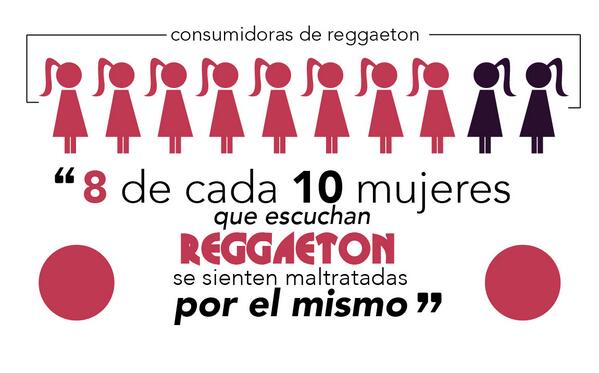
“Reggeaton female consumers: 8 out of 10 women who listen to Reggaeton feel that they are mistreated by it”. Image from Twitter account of campaign @Usa_larazon [Use your head].
“Si fueras un clavo y yo un martillo, quisiera CLAVARTE” #usalarazon #campaña #porlamujer #compartelo pic.twitter.com/izJmCS4GcB
— Usa la razon (@Usa_larazon) Mayo 6, 2014
If you were a nail and I a hammer, I'd want to NAIL you.
According to Mexican news site Noticaribe [es], the photographers started the campaign “Usa la razón” (Use your head) because:
Las letras [del reggaetón] contienen cierta dosis de contenido sexual y violencia, muchas veces la mujer es tratada y vista como un objeto. Frases como “pa” que se lo gozen [sic], pa” que se lo rozen [sic]” o “a ella le gusta que le den duro y se la coman”, entre otras. Un grupo de personas se unieron para fomentar una campaña con cuatro afiches donde muestra la violencia en las letras del reggaetón. El objetivo de la campaña “Usa la razón”, es generar conciencia en las mujeres que escuchan este género musical y así sean conscientes del papel que protagonizan en él.
[Reggaeton] lyrics have some dose of sexual content and violence, women are treated and seen as an object. Phrases such as “so they can enjoy, so they can graze it” or “she likes it hard and to be eaten”, among others. A group of people got together to start a campaign with four posters that show the violence within reggaeton lyrics. The “Use your head” campaign aims to raise awareness among women who listen to this music genre so they can be aware of the role they have in it.
Reggaeton has its roots in Caribbean music, which Urban Dictionary says came to Latin America in the '70s, “when Jamaican workers moved to Panama to work on the canal and brought reggae music with them”. With some further inspiration from Panama's Reggae en Español, Reggaeton was invented and shaped in Puerto Rico, which is where most of its current artists come from. It started getting popular with audiences in North America, Europe, Asia and Africa in the early 2000s. Lyrics tend to be about social criticism, reflection, love and daily life problems.
The campaign (@Usa_larazon) and its graphic images took off on Twitter.
#usalarazon que la música no degrade tu condición pic.twitter.com/HVcaBYK9Co
— Usa la razon (@Usa_larazon) May 3, 2014
Don't let music humiliate your condition [as a woman].
En la cocina Voy a darte TABLA #usalarazon #porlamujer pic.twitter.com/iQiKVToiIz
— Usa la razon (@Usa_larazon) Mayo 3, 2014
In the kitchen, I'm going to give you some WOOD [meaning that she will be beaten with a rolling pin or some other wooden kitchen tool].
“A ella le gusta que le den duro y se la COMAN” #usalarazon #porlamujer @cartelurbano pic.twitter.com/t3Zu87CLC5
— Usa la razon (@Usa_larazon) Mayo 12, 2014
She likes it hard and to be EATEN.
The campaign resonated with some people:
Es el Reggaeton un tipo de violencia contra la mujer? Campaña colombiana invita a que reflexionemos sobre ello @Usa_larazon
— Fiorella Solari (@Fio_Solari) junio 6, 2014
Is reggaeton a kind of violence against women? Colombian campaign invites us to reflect on that.
@DatosGrachi @JeyFresitah @OrianaTampoa1 las invito a ver esta interesante campaña: @Usa_larazon #QueLaMusicaNoTeDenigre #UsaLaRazon
— Alejandro Torres (@AlejoEl_Conejo) junio 6, 2014
I invite you guys to take a look at this interesting campaign.
Recomendado especial para @MannyMontes: la campaña @Usa_larazon Un poco fuerte pero muestra una verdad incomoda
— Andrés Camacho (@SoyElEvangelico) junio 6, 2014
Especially recommended for @MannyMontes: the campaign @Usa_larazon Kind of intense, but depicts an uncomfortable truth.
Como pides respeto y en la disco desarmas tu esqueleto bailando musica con mensaje enfermo que sin tocarte manosea tu cuerpo? @Usa_larazon
— CindyLo Parra (@CindyLoCantant) junio 6, 2014
How can you ask for respect then at the night club practically dislocate your bones dancing to music with a sick message that gropes your body without touching you?
#Usalarazón: Excelente campaña de Usa la razón en contra de las letras ofensivas de las canciones. @Usa_larazon http://t.co/p539IqKCw9
— La R-vuelta Colombia (@larvuelta) junio 6, 2014
Excellent campaign, Use your head against the offensive lyrics of some songs.
Some tweeted against the campaign.
@Usa_larazon Ahora pondrán a todos en contra del reggaeton? están exagerando demasiado, en el metal hablan de violar a la mujer, infórmense!
— Rubí Dueñas (@RubiShayla) junio 9, 2014
Now we all are going to be biased against reggaeton? This is overkill, in metal they talk about raping women. Go find out!
@gabitaitaita @Usa_larazon vaya gilipollez
— cid (@ShurCid) junio 9, 2014
Such nonsense.
One reggaeton group said that their lyrics actually work to highlight women's issues:
@Usa_larazon Los invitamos a escuchar nuestro nuevo sencillo #YaNoAguantoMás en contra de la degradación de la mujer https://t.co/1pSjCSIYp4
— Ziudad Real Oficial (@ZiudadReal) junio 5, 2014
We invite you to listen to our new single YaNoAguantoMás [I can't take it anymore] against the humiliation of women.
In response to any potential criticism, “Use Your Head” wrote on their Facebook page [es]:
Como campaña, no pretendemos ir en contra del reggaeton, solo queremos que haya más consciencia [sic], para que la reacción sea valorar más a la mujer en este genero musical, no como objeto sexual sino como ser pensante, inteligente y valioso tanto en espíritu cuerpo y alma.
As a campaign, our intention is not to be against reggaeton, we just want there to be more awareness, so that women might be appreciated more within this music genre, not depicted as a sexual object, but as a deeply intelligent and valuable thinker in spirit, body and soul.
And what do you think? Do reggaeton lyrics indeed humiliate women or is it a case of exaggerated outrage over some harmless words?







1 comment